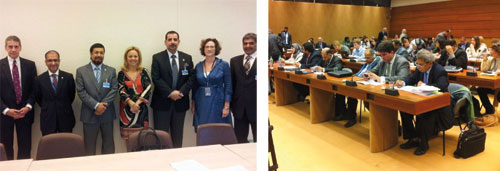
|
 |
 |
|
|
|
|
|
|
|
|
|
|
|
|
|
|
|
|
|
|
|
|
|
|
Adhering to Human Rights StandardsA Battle to Gain the Trust of International Human Rights OrganizationsDeveloping the human rights and political situation is a battle that must take place within Bahrain itself and not outside it. This is because the main political players are in Bahrain and it is the Bahraini people who will benefit from the development and improvement of the situation. The reactions of the outside world are merely a symptom of the root of the problem. Therefore, all efforts should be directed at solving the domestic problems and issues. The political crisis which erupted two years ago has had a negative effect on the Human Rights situation and put Bahrain in the spotlight of foreign media and international organizations. Both parties, the opposition and loyalists, are trying hard to lobby the world behind their respective points of view. To achieve this end, they are prepared to present exaggerated or even fabricated information in order to mobilise international public opinion and gain support for their political positions. We were hoping that political disagreements will be dealt with locally and that the concerned parties will exert serious efforts in order to reach a political solution to the crisis, as opposed to moving their disagreements abroad in order to score points against each other. The conduct of both the loyalists and opposition elements during a meeting in Geneva in September 2012 was an example of the lack of respect for the opinions of others. The situation even necessitated the interference of UN security and this negatively affected their credibility. Each party also filed a complaint against the other. The BHRM believes that the problem in Bahrain is a political one that has human rights implications. Hence all efforts should be concentrated on solving the political issues inside the country. The failure to find a political solution resulted in the problem being transferred abroad within a Human Rights concept. International organizations have become –at least in the eyes of some- part of the political disagreement as they are seen to be supporting one side against the other. Bahraini delegations abroad failed to adhere to human rights standards in dealing with representatives of International Human Rights Institutions and Organisations by either providing incorrect and exaggerated information or inaccurate analysis. For instance, the statements of some international bodies were manipulated in order to make use of them politically. This in turn affected the credibility of these delegations. On February 15th 2013, during a visit to France, a Bahraini parliamentary delegation met the President of the International Federation for Human Rights FIDH, Mrs Suhair Bal-hassan. The meeting took place at the organisation’s Headquarters with the purpose of discussing the situation in Bahrain. On 19 February 2013 the Bahrain News Agency issued a statement by the Parliament which stated that (The president of FIDH expressed the appreciation of the International Human Rights Organisations of the serious and effective steps taken by Bahrain in implementing the BICI’s recommendations as well as the latest UPR recommendations.) On the 21st of February 2013, the FIDH, issued a statement denying that quote attributed to its president and stating that the latter has actually expressed concern over the ongoing grave and systematic human rights violations, and over what she views as a failure to effectively implement both Bassiouni’s and the UPR’s recommendations.. FIDH kindly advised the authorities to allocate the State’s resources to addressing the deep human rights crisis rather than to misleading PR campaigns. The same scenario was repeated after a meeting on February 18th in Brussels with EU Parliamentary member, Marietje Schaake, a Dutch politician. On 20 February, Schaake posted on her website a statement in which she stated that she agreed with the delegation that the meeting would be off the record. , but was stunned when news of the meeting were reported in Bahrain with a false and fabricated account of what was actually deliberated. She added that even though she believes in transparency but due to the fa?t that she had in the past experienced a number of cases where Bahraini media published articles that were untrue, she wanted to avoid any publications. According to the EU Parliamentarian, this incident has undermined her meeting with the Bahraini delegation. Several points can be derived from the above case:
It would not detract from their status or efficiency if, rather than resort to the practice of sweetening the outcome of their meetings abroad, official or parliamentarian delegations could follow a more appropriate route by issuing statements following such meetings that are credible and more in line with the facts , such as stating that they took note of the issues raised during the meetings regarding human rights in Bahrain and that they did their best to explain all the steps that has been taken to im?rove the situation and reassure the International Community of Bahrain’s continued commitment to cooperation with international organizations in order to redress past mistakes and improve human rights. Such kind of discourse would be closer to the truth, promote trust and build credibility, as opposed to a discourse that falsely claims that the international organizations were given all the facts and had apologized for misunderstanding the local situation; or that Bahrain has become an oasis for human righ?s and grand unprecedented achievements, as this involves exaggeration and fabrication. Such kind of discourse is outdated and could undermine the positive efforts of the Government. It’s most unlikely that international human rights organizations will be changing their stances soon. Both time and effort are needed to develop the human rights situation locally. This will also require a considerable amount of transparency, flexibility, honesty and openness. These qualities are crucial if you want to build a relationship with the international organizations based on credibility and trust. |
